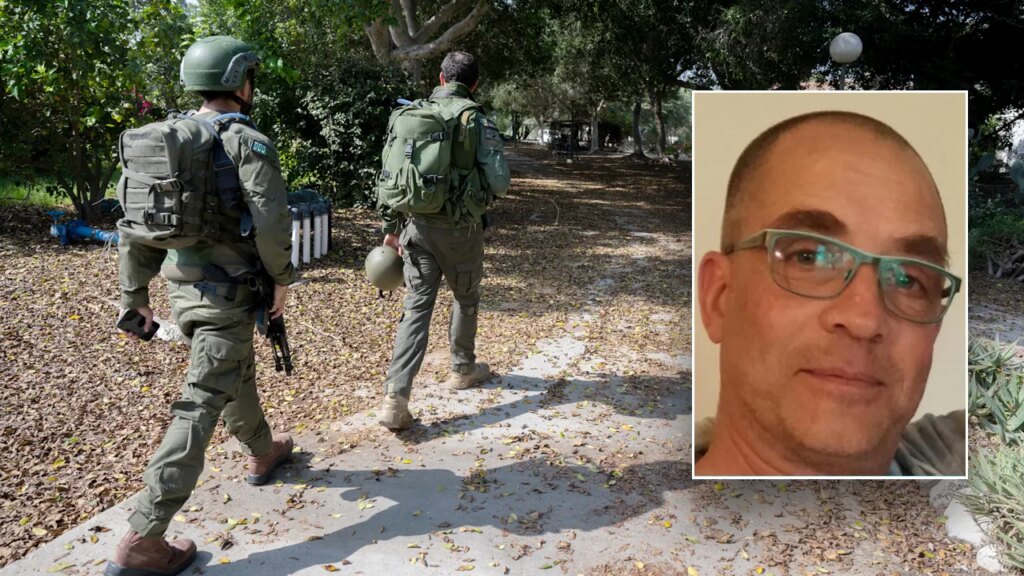In a heartbreaking twist to a tragic chapter in Israel’s ongoing conflict, the body of Lior Rudaeff, an Israeli hostage who displayed immense bravery during an assault on October 7, 2023, has been returned for burial. The 61-year-old heroically defended his community against terrorists before ultimately losing his life and being taken captive by the Islamic Jihad terrorist organization. His family, the Hostages and Missing Families Forum, and the Israel Defense Forces (IDF) have confirmed the return of his remains after 763 days, a moment laden with grief and sorrow for those left behind.
| Article Subheadings |
|---|
| 1) The Valor of Lior Rudaeff |
| 2) Details Surrounding His Captivity |
| 3) The Human Toll of Conflict |
| 4) Community Responses and Remembrance |
| 5) The Broader Context of Hostage Situations |
The Valor of Lior Rudaeff
On October 7, 2023, Lior Rudaeff took a stand for his community at Kibbutz Nir Yitzhak during one of the most violent chapters in recent Israeli history. Aged 61, Rudaeff, along with an emergency response team, valiantly confronted a group of terrorists attempting to infiltrate the kibbutz. His actions during this fierce battle have been described as “heroic” by advocates, emphasizing the courageous spirit he embodied as he fought to defend his home. In the eyes of his community, he became a symbol of resilience amid chaos, standing up against overwhelming odds before ultimately giving his life in the defense of his family and neighbors.
Details Surrounding His Captivity
After falling during the battle on that fateful day, Rudaeff’s body was taken by members of the Islamic Jihad and transported to Gaza. His family, along with various support organizations, spent nearly two years campaigning for his return. The Israel Defense Forces reported that Rudaeff’s death was ultimately confirmed on May 7, 2024, bringing waves of anguish to his loved ones. His return, although a moment of closure, is a reflection of the long-standing conflict and the ongoing pain experienced by families affected by such tragedies. The case shines a light on the harsh realities of captivity and loss in war.
The Human Toll of Conflict
The aftermath of Rudaeff’s ordeal poses difficult questions regarding the broader human toll of the ongoing Israeli-Palestinian conflict. As stated by the Hostages and Missing Families Forum, Rudaeff was not just a statistic; he was a husband and father leaving behind a grieving family that includes his wife and four children. The IDF’s expression of condolences and commitment to recovering all deceased hostages underscores the ongoing humanitarian crisis facing numerous families impacted by conflict. As of the latest reports, five additional bodies of deceased hostages remain in Gaza, indicating that his story is far from isolated; it is part of a larger narrative that continues to unfold where loss and heartache persist.
Community Responses and Remembrance
Rudaeff’s legacy has ignited an outpouring of support from his community and beyond. Known for his generous spirit, he had dedicated over 40 years as an ambulance driver and was an active member of the Nir Yitzhak emergency response team. His commitment to public service and volunteerism profoundly affected those around him, prompting numerous local vigils and tributes following his death. Community members and organizations are rallying to ensure that his story and the stories of those like him are not forgotten. The emotional aftermath of such a loss resonates widely, as the community unites in remembrance, honoring the sacrifices made by individuals like Rudaeff.
The Broader Context of Hostage Situations
In the larger context, the plight of Rudaeff and others highlights the ongoing challenges of hostage situations in conflict zones. The IDF commented on the necessity for Hamas to fulfill its part of the agreement regarding hostages, signifying the tense negotiations and political intricacies involved in such crises. As inherent risks escalate within these high-stakes negotiations, families cling to hope while facing harsh realities. Efforts continue to prioritize humane treatment and the return of loved ones in conflicts worldwide, but the emotional and psychological scars remain long after closure is achieved.
| No. | Key Points |
|---|---|
| 1 | Lior Rudaeff was a heroic figure who died defending Kibbutz Nir Yitzhak. |
| 2 | His body was returned after being held by the Islamic Jihad for 763 days. |
| 3 | Rudaeff’s return highlights the ongoing pain of families affected by conflict. |
| 4 | The local community is honoring his legacy through remembrance activities. |
| 5 | Hostage situations remain prevalent in conflict zones, raising complex issues. |
Summary
The return of Lior Rudaeff’s body encapsulates the struggles faced by families entangled in the ongoing Israeli-Palestinian conflict. As a community mourns its hero, Rudaeff’s legacy reminds us of the human cost of war and the challenges surrounding hostage situations. With his story serving as both a poignant reminder and a rallying cry, efforts to address the humanitarian crises resulting from conflict continue to gain urgency.
Frequently Asked Questions
Question: Who was Lior Rudaeff?
Lior Rudaeff was a 61-year-old Israeli man who bravely defended his community during an attack on October 7, 2023, and later became a hostage.
Question: What organization was responsible for taking Rudaeff hostage?
Rudaeff was taken hostage by the Islamic Jihad terrorist organization during the conflict.
Question: What does Rudaeff’s story signify for the community and the nation?
Rudaeff’s story symbolizes the sacrifices made by individuals in defense of their communities and the ongoing toll of conflict on families and nations.


